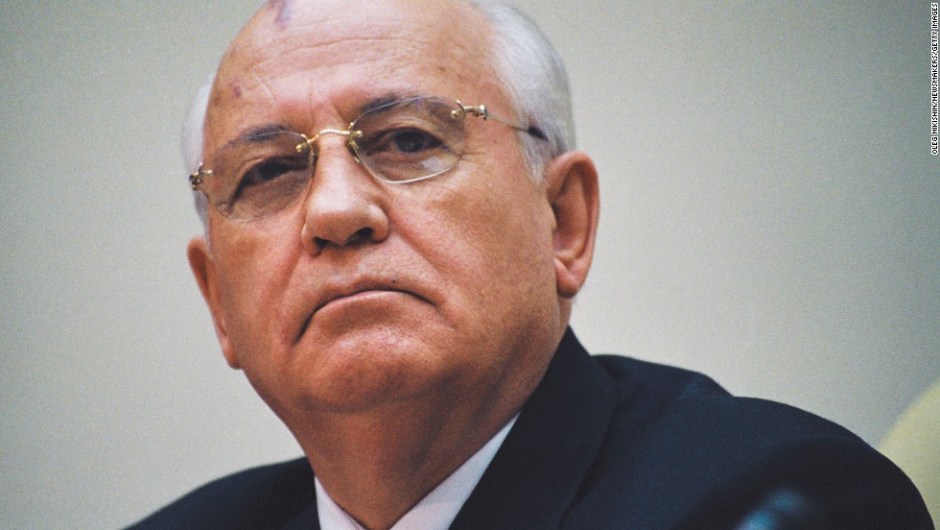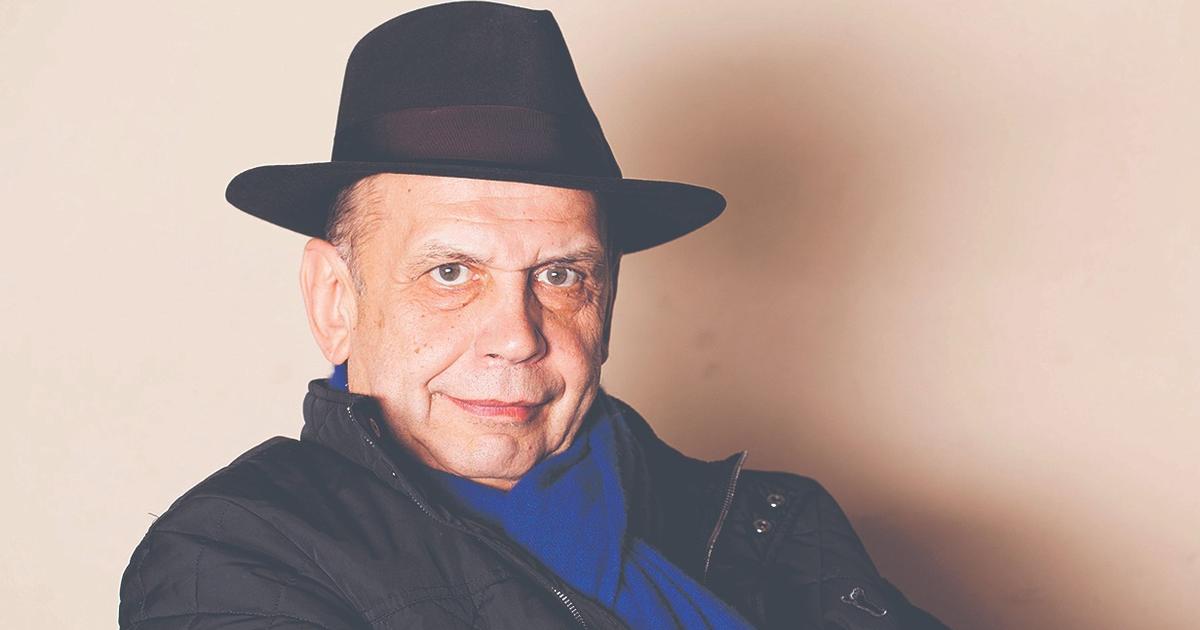1 of 26
|
Mikhail Gorbachev at a conference in Moscow in 2001. Gorbachev led the Soviet Union from 1985 until his fall in 1991. He changed the world's expectations of the Soviet Union by striving to make a more efficient and democratic state that engaged in politics world.
(Credit: Oleg Nikishin/Newsmakers/Getty Images) →
2 of 26
|
Gorbachev at age four in Privolnoe, Ukraine, around 1935. (Credit: APIC/Getty Images)
3 of 26
|
Gorbachev attends the October Revolution anniversary celebration in Moscow in 1984. (Credit: Georges DeKeerle/Getty Images)
4 of 26
|
Gorbachev and then-British Prime Minister Margaret Thatcher in England in 1984. (Credit: Peter Jordan//Time Life Pictures/Getty Images)
5 of 26
|
Then-President of France François Mitterrand with Gorbachev in Moscow in 1985. (Credit: Keystone-France/Gamma-Keystone via Getty Images)
6 of 26
|
Then-US President Ronald Reagan speaks with Gorbachev during a two-day US-Soviet summit in Geneva in 1985. (Credit: AFP/Getty Images)
7 of 26
|
Gorbachev at a news conference in Reykjavik, Iceland, in 1986. (Bryn Colton/Getty Images)
8 of 26
|
Gorbachev waves to supporters during a visit to Prague in 1987. (Chris Niedenthal//Time Life Pictures/Getty Images)
9 of 26
|
Gorbachev meets with employees at a meatpacking plant outside Moscow in 1987. (Sovfoto/UIG via Getty Images)
10 of 26
|
Gorbachev meets with members of the crew of a nuclear submarine during a visit to Severomorsk, Soviet Union, in 1987. (Sovfoto/UIG via Getty Images)
11 of 26
|
Gorbachev and Reagan sign a treaty eliminating US and Soviet intermediate-range and shorter-range nuclear missiles in Washington in 1987. (AFP/Getty Images)
12 of 26
|
Reagan and Gorbachev visit Governors Island in New York in 1988. (BILL SWERSEY/AFP/Getty Images)
13 of 26
|
President George HW Bush with Gorbachev in Valletta, Malta, during a US-Soviet summit in 1989. (JONATHAN UTZ/AFP/Getty Images)MOREHIDE
14 of 26
|
Gorbachev is sworn in at the Congress of People's Deputies in Moscow in 1990. (V.ARMAND/AFP/Getty Images)
15 of 26
|
Boris Yeltsin with Gorbachev during a session of the Congress of People's Deputies in Moscow in 1990. (Sasha Stone/Time Life Pictures/Getty Images)
16 of 26
|
Gorbachev votes in Moscow in 1991 in the first Soviet referendum to decide whether the country will remain a united state.
(VITALY ARMAND/AFP/Getty Images)
17 of 26
|
Gorbachev accepts the Nobel Peace Prize in Oslo, Norway, in 1991. Gorbachev received the award in 1990. (OLAV OLSEN/AFP/Getty Images)
18 of 26
|
Gorbachev shakes hands with Yeltsin after his inauguration as Russian president in Moscow in 1991. (VITALY ARMAND/AFP/Getty Images)MOREHIDE
19 of 26
|
Bush and Gorbachev during a joint news conference concluding a two-day summit between the United States and the Soviet Union in 1991 in Moscow.
(MIKE FISHER/AFP/Getty Images)
20 of 26
|
President Reagan and his wife, Nancy, chat with Gorbachev and his wife, Raisa, in the front yard of the Reagan ranch in Santa Barbara, California, in 1992. (MIKE NELSON/AFP/Getty Images)
21 of 26
|
Gorbachev announces his candidacy for the presidency in Moscow in 1996. Gorbachev got 1% of the vote.
(YURI KADOBNOV/AFP/Getty Images)
22 of 26
|
Gorbachev with his daughter Irina (2nd from right) and granddaughter Krenia (3rd from right) at Raisa Gorbachev's coffin in Moscow in 1999. (MISHA JAPARIDZE/AFP/Getty Images)
23 of 26
|
Gorbachev pays his respects to Russian soldiers at a Russian military cemetery in Marl, Germany, in 2003. (KIRSTEN NEUMANN/AFP/Getty Images)
24 of 26
|
Gorbachev next to a bust of him created by French artist Serge Mangin after unveiling it to guests in Berlin in 2009. (BERTHOLD STADLER/AFP/Getty Images)
25 of 26
|
Gorbachev in London during the finale of the Gorby 80 Gala, a celebration of his 80th birthday, in 2011. (Ian Gavan/Getty Images)
26 of 26
|
Gorbachev laughs with former Polish President Lech Walesa at the opening of a conference to celebrate the 20th anniversary of the Green Cross International in 2013. (FABRICE COFFRINI/AFP/Getty Images)MOREHIDE
Moscow (CNN) --
Former Soviet leader Mikhail Gorbachev, who has died at the age of 91, warned the United States and Russia to avoid a "hot war" during an interview with CNN in 2019. Here's a recap of the dialogue with reporters .
The day CNN sat down with Gorbachev in Moscow, then-US President Donald Trump had paid a surprise visit to US soldiers in Afghanistan, where he announced that peace talks with the Taliban were resuming.
Like the Soviet Union three decades ago, the United States was trying to negotiate an exit from Afghanistan while making sure that the central government in Kabul did not collapse.
In 1989, the United States and the Soviets were on opposite sides of the conflict, with Washington supporting mujahideen fighters trying to topple the Soviet-backed regime government of Afghanistan's president, Mohammad Najibullah.
But just over two years later, the USSR collapsed, aid to the Kabul government dried up, and the Najibullah government fell.
Asked what lessons could be drawn from the withdrawal of Soviet troops, Gorbachev said: "They must withdraw. That's the main lesson. You know, it's like a match. The match is lit, a fire spreads. And these clashes, When the major major countries in this conflict become more and more involved, they are dangerous to all nations."
Russia began withdrawing its soldiers from Afghanistan in the late 1980s.
One of the many historical events that Gorbachev starred in as a leader was the signing of the Intermediate-Range Nuclear Forces Treaty in 1987.
advertising
That pillar of arms control effectively fell apart this year, after the United States formally withdrew and the Russian government said the deal had been trashed.
Asked about the demise of the treaty he signed with then-US President Ronald Reagan, Gorbachev expressed hope that such arms control agreements can be revived.
"All the agreements that exist are preserved and not destroyed," he said.
"But these are the first steps towards the destruction of [what] must not be destroyed in any case. Therefore, if this path goes further, then everything is possible. This must not be allowed."
The ultimate goal of arms control, he added, must be to get rid of nuclear weapons altogether.
That, however, seems like a more remote possibility, given the enduring mistrust between Moscow and Washington.
During the interview, Gorbachev expressed his hope that Washington and Moscow could find a way to prevent a "hot war" in the future.
"I think this should be avoided," Gorbachev said, when asked if the world was entering a new and dangerous era of multipolar rivalry between states.
"It's good that there is already a conversation all over the world and people are talking, people are reacting, and this is the most important thing.
"The speakers and the politicians, the people understand that this, the New Cold War, must not be allowed. This could result in a hot war that could mean the destruction of our entire civilization. That must not be allowed."
That Cold War, of course, has been a subject of intense pop culture interest, especially after the release of HBO's acclaimed "Chernobyl" television series.
The recent HBO series "Chernobyl" examines Gorbachev's decision-making during the nuclear disaster.
When asked if he had seen the series, Gorbachev said that he had not, but suggested that his decision-making as Soviet leader at the time of the 1986 nuclear disaster may have been misrepresented.
"I haven't seen it, but I know in detail" the history of Chernobyl, he said.
"I will say that as a result, the most important thing is that we have studied all the reasons [for the disaster]. All these conclusions were given to all other countries. These findings are a lesson for everyone. They say: 'Why were you silent? for several days?' But I say it was exactly as I said before, not the other way around. We didn't understand what had happened."
Gorbachev is the subject of "Meeting Gorbachev," a documentary by filmmaker Werner Herzog that opens in Russia on December 5.
The film's reception is a must see: Gorbachev is not revered in Russia the way he was in the West, and his name brings up associations of the painful Soviet collapse that still hangs over society and culture. russians
Editor's note:
This interview was originally published on December 1, 2019. The information was updated after the death of the former Soviet leader.
Cold WarRussian NewsUSSR




/cloudfront-eu-central-1.images.arcpublishing.com/prisa/BKILBZWDTBB53BQIZTALBOYMGQ.jpg)




